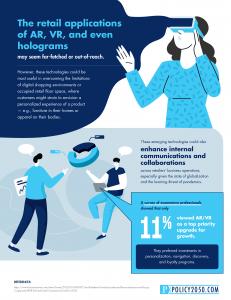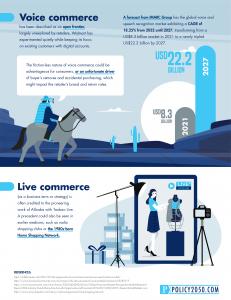Smart retail technologies and trends are carefully examined in a new report, as retailers experiment with new tech deployments.
— David Pring-Mill, Policy2050.com founder and report author
SAN FRANCISCO, CALIFORNIA, USA, September 28, 2022 /EINPresswire.com/ — The COVID-19 pandemic forced even culturally reluctant retailers to mimic or learn from ecommerce platforms and brands’ own direct-to-consumer, sometimes lifestyle-associated channels. This change was only the beginning: digital transformation lays the groundwork for optimization, and new hardware awaits. “Smart retail” could bridge the gap between lockdown era approaches and a new consumer reality characterized by inflation and different forms of uncertainty.
The vast majority of retailers expect to increase their use of technology, going beyond omnichannel capabilities by layering on creative customer experiences (VR/AR/MR) and emerging acquisition channels (voice, live, and social commerce). Venture capitalists foresee opportunities for smart retail startups to leverage data and increasingly capable hardware in unique ways, such as automated or virtual stores, leading to high valuations and exits. For consumers, the promise of smart retail is typically a more cohesive, personalized, engaging, and beneficial shopping experience.
Policy2050, a research firm that studies technological disruptions and proposes business/societal advancement, examines this quickly changing space in the new report “Smart Retail: Technologies and Trends (2022-2025).”
Within its 95 pages of analysis, supported by detailed case studies and over 200 quantitative insights, the report identifies smart retail trends such as:
• Smart retail providers often express an interest in moving the best of online to offline or vice versa.
• Smart retail providers frequently encourage retailers to define their goals, experiments, and metrics at the outset of a pilot program or deployment. Otherwise, it’s harder for the retailers to extract value and achieve internal functional alignment, which for smart retail startups means a lack of B2B retention.
• Many retailers haven’t yet achieved their true analytics or omnichannel potential, nor have they settled on exactly how to restructure their organizations around new data sources and insights. Even though they’re anticipating technological upgrades, retailers’ current systems still fall short of demands and ideal resolution times.
• A digital-first organizational culture in retail often requires the recruitment or promotion of digital talent. Younger talent may demand a remote or hybrid workplace. KPIs must be well-defined and aligned with team functions, while technological experiments should often be linked with efficiency gains.
• For consumers, digital inspiration (Pinterest, TikTok, etc.) doesn’t eliminate the need for brick-and-mortar-based exploration; it might simply be the first touchpoint.
• Inventory directly factors into retail brand building, especially through private labels. Today, inventory curation can be intuitive, data-driven, and engineered for social media virality. Custom-fit technologies could represent a new era for fashion retailers’ operations and inventory.
• Retailers need to evaluate their agreements with smart retail companies to ensure that their customer relationships and data are handled appropriately. Security vulnerabilities are especially evident in the IoT space.
• Smart retail providers must strike the right balance between value-based pricing and pricing transparency. Some smart retail solutions aren’t considered essential, compared to day-to-day needs like accounting or inventory management. Product demos are a sometimes overlooked opportunity to contextualize pricing and value within a competitive landscape where there are multiple solutions to any given business problem.
COMPANIES MENTIONED
Smart retail providers mentioned in this report include:
• Grabango
• Obsess
• SES-imagotag
• FutureProof Retail
• Splitit
• Meta
Retailers mentioned in this report include:
• Walmart
• Amazon
• Gap Inc.
• Carrefour
Experts interviewed for this report include:
• Daniel Markuson, Digital Privacy Expert, NordVPN
• Andrea Giacomini, CEO, Mitto
• Pranav Saxena, CTO, NZ Technologies
• Barbara Casey, CEO, Mobile High 5
• Lenny Adams, Founder, Toli 360
• Avi Efrat, Founder and Director, Fantastic Framing
ABOUT POLICY2050.COM
Policy2050.com provides business news and analysis. We seek to influence the future of tech policy and business strategy in order to bring about a sustainable, fair, and vibrant economy.
The original graphics accompanying this release can be freely used by the news media (including content marketing blogs) with attribution to Policy2050. Additional media materials are available upon request.
Inquiries can be directed to david.pringmill@policy2050.com.
David Pring-Mill
Policy2050.com
email us here
Visit us on social media:
Twitter
![]()





